|
Back in the days when it was popular to "go west and grow up with
the country", a nineteen year old youth in Cumberland county, Pa.,
was struck with the fever. Having no money, he borrowed $65
from his father. With that $65 - most of which was spent on
making the trip to his destination, Decatur, Ill. - the young man
entered upon a career which brought him a fortune, as well as the
high regard of the city in whose progress he played an important
part. The young man was David S. Shellabarger, who arrived in
Decatur May 28, 1856. He had been born in Pennsylvania July
11, 1837. 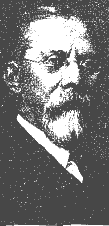
D. S. SHELLABARGER
Though he first went into
the lumber business, most of his life here was devoted to his
milling interests. For forty years he directed activities of
the Shellabarger mill at North Water and Cerro Gordo streets. In
1863 the Great Western mill at Water street and the Great Western
railroad was purchased by D. S. Shellabarger. Isaac
Shellabarer and Benn Dillehunt, D. S. Shellabarger later buying the
interests of the other two. For a number of years William
Bowers was associated with Mr. Shellabarger in the firm. In
1888 Mr. Shellabarger became sold owner of the mill and his three
sons, W. L., F. D. and L. C. Shellabarger, came into the business.
Extensive improvements, building additions and installation of new
types of machinery put the mill into the front rank of such
enterprises.
SHELLABARGER MILL
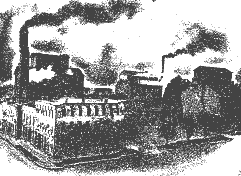 Before going into the
milling business on North Water street Mr. Shellabarger had been
connected with another flour mill. He and George Priest had
bought out the Condell interest in the Henkle & Condell mill.
That mill burned in 1859, but it was rebuilt. Mr. Shellabarger
sold out his interest in that mill. Mr. Shellaberger's business
interests were not confined to Decatur. Recognizing the
importance of location in the heart of the wheat growing country he
established mills in Kansas. In both Illinois and Kansas he
owned long strings of elevators. In 1903 Mr. Shellabarger
disposed of his milling interests in Decatur to the American Hominy
company. Other activities also claimed his attention. For
twenty years Mr. Shellabarger was head of a street car line.
For fifteen years he was a member of the board of education, and
most of that time was the president of the board. One term, in
1872, he was mayor of Decatur, and at various times served as a
member of the city council. Once he was a candidate for
congress, but was defeated for the office by William B. McKinley.
He was identified with bank, coal and other business enterprises,
among them the bagging factory. For seven years he was
president of the National Bank of Decatur. He also was
president of the Manufacturers and Consumers Coal company. As a
church leader he was known for years, and was chairman of the
building committee of the Grace Methodist church when its present
building was erected. Mr. Shellabarger and Miss Anna Krone were
married in 1862. She was the daughter of Mr. and Mrs. David
Krone, proprietors of the Macon House. The Shellabargers'
first home was on Jackson street, then at the southeast corner of
Franklin and Eldorado, the house which for some years past has been
used as an annex to the high school building. Mr. Shellabarger was
the first to respond when citizens of Decatur were asked to raise
$100,000 to meet the offer of James Millikin in establishing the
Jams Millikin University. His gift to that fund was $5,000.
John and Isaac Shellabarger, brothers, were the first of the
Shellabarger family to come to Decatur. They had been through
here on a horseback trip in 1836 and entered land. Later they
came here to locate. Isaac Shellabarger arrived in Decatur to make
his home in 1852. He brought his family with him, making the
trip in a carriage. Mr. Shellabarger built a frame house at
the northwest corner of Franklin and William streets, and later
bought the house a the corner of Eldorado and Franklin erected by G.
D. Haworth. For many years Isaac Shellabarger was connected with
the business life of Decatur, being interested in the lumber
business, in milling, agricultural works, banking and other
enterprises. He assisted in establishing the gas company and
the waterworks plant. He was of an inventive turn of mind, and
invented a number of devices used in mills. After his nephews, D.
S. Shallabarger and William Bowers, became established here, Isaac
Shellabarger sold his interests in the Shellabarger mill on North
Water street to them. Later he became interested in the lumber
and milling business in Wichita, Kan. When John Shellabarger
located in Decatur he established a lumber yard. He gave a
position in that yard to David S. Shellabarger, when the latter came
in 1856. John Shellabarger died soon after his young nephew
came, and the young man took his place in the business.
H. MUELLER Hieronymus Mueller came to Decatur in the year
1857 and opened a gun repair shop on the south side of the 100 block
on West Main street. That was the beginning of the business
career in Decatur of the man who later started the H. Mueller
Manufacturing Company plant, which has developed into one of the
city's biggest industries. In 1870 Mr. Mueller was appointed city
water tapper by Mayor M. Forstmeyer. The crude method of
making service connections with city water mains was not to his
liking, and it was not long until he had invented a water tapping
machine and begun its manufacture. The machine was such an
advantage that the demand for it continually increased. Other
inventions in the way of waterworks goods were brought out by Mr.
Mueller. The frame building he was then occupying at 222 East
Main street became too small to accommodate the enlarging business
and necessitated putting up a new building. By 1885, Mr.
Mueller was employing twenty or twenty-five men in his factory.
That year he separated the gun repair shop from the factory,
establishing the gun shop on Merchant street.
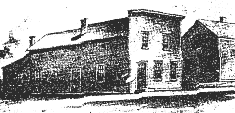
H. MUELLER'S FIRST SHOP AND RESIDENCE, 1857
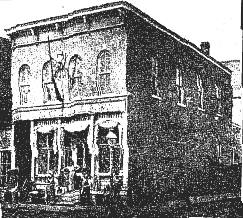
MUELLER FACTORY, 1872 - 1895 In 1886 Mr.
Mueller took five of his sons into partnership with him. They
were Henry, Robert, Fred, Philip and Adolph. His other son,
Oscar, became a member of the firm in 1896. In 1891 Mr. Mueller
organized the Mueller Plumbing and Heating company. He
disposed of his interest in this business, however, in 1896, and
then sold his gun store in 1897, leaving him free to devote his
attention to the increasing business of the H. Mueller Manufacturing
company, which was incorporated in 1893. The first unit of the
Mueller plant on Cerro Gordo street was erected in 1895. Since
that time, many new buildings have been added at that site,
factories have been established in Sarnia, Can., and Port Huron,
Mich., an iron foundry has been put into operation on East Eldorado
street, and the vitreous ware factor has been erected south of
Decatur. Another business developed is the Mueller Fountain
and Fixture company.
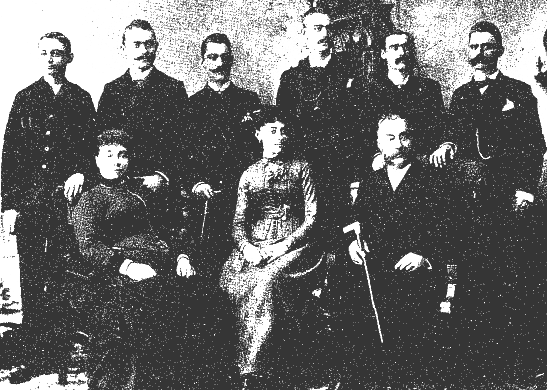
MUELLER FAMILY IN 1888
Left to right - Standing: Oscar, Adolph, Robert, Fred, Philip,
Henry (three last now decased), Seated: Mrs. Hieronymus
Mueller (deceased), Leda Mueller (Cruikshank), Hieronymus
Mueller
(deceased). Mr. Mueller died from the effect of burns March
1, 1900. His wife, whose maiden name was Fredericka Bernhardt,
died Jan. 26, 1911. LOWBER BURROWS His
love for the beautiful in flowers and in music, and his social
leadership gave Lowber Burrows a place all his own in the life of
Decatur. He was the first person in Decatur and in this part
of the state to have a private conservatory, where he grew varieties
of rare and beautiful plants. Through Decatur was rather a
rough town when Mr. Burrows first came, lacking culture and polish
to which he had been accustomed in the east, he never lost any of
the courtesy and dignity to which he had been bred.
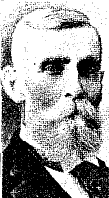
L. L. BURROWS The only public
office Mr. Burrows ever consented to hold was that of member of the
park board, from 1892 to 1899. He was president of the Decatur
Musical Union which was organized in Decatur in 1861 and was
interested in every means to advance the art of music. His
home was a center for social life. In the St. John's church,
in the Decatur club, in Macon lodge No. 8, A. F. & A. M., he was one
of the leading members. Yet he is as well remembered for his
business life in decatur as for the finer arts. He came to Decatur
through the influence of J. J. Peddecord, who gave him a position in
his store.1
From that time until the death of Mr. Peddecord, the two men never
severed business relations. When Mr. Burrows was twenty-one years
old he went back to Philadelphia on a buying trip for the store, and
on his return he brought something else besides the goods he had
bought. He was married March 14, 1854, to Mary Lavinia Bering,
a sister of J. E. Bering, and he brought his bride back with him.
They came by train as far as Wyckles station, since that was as far
as the railroad track had been laid at that time. The rest of
the trip was made by stage. From that time on Mr. and Mrs. Burrows
lived at 271 West North street, first in a small frame house, and
later in the brick residence which Mrs. Burrows built in 1868.
It was torn down in 1929. The banking career of Mr. Burrows is
told in another chapter. Mr. Burrows remained in business
until his death, Oct. 16, 1910. Mrs. Burrows passed away Jan.
8, 1908. Mr. and Mrs. Burrows were the parents of five
children. SILAS PACKARD Seventy-eight
years Silas Packard lived in Decatur. When he was only a year old,
his parents, traveling in a covered wagon, loaded with household
effects and seven children, left their home in Royalton, Vt., and
headed for Macon county, Ill. They arrived in July of the year
1830. That was the hard year in Macon county. Soon after
the family's arrival, Mr. Packard, the husband and father, fell a
victim to malaria. He died on Sept. 8.
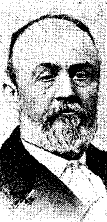
SILAS PACKARD As a
boy, Silas worked as a farm hand and earned as much as 25 cents a
day. When a little older he carried mail and received 50 cents
a day. When he was twenty years old he went to California,
remaining in the west for several years. When he returned he
had enough money to set himself up in business. His
business career in Decatur included a variety of enterprises.
He ran a lumber yard, a dry goods store, a hardware store, conducted
a farm, was interested in the banking business. His greatest
success, however, was in real estate. For sixty-two years Mr.
Packard owned the 80 acre tract once known as Riverside park, on the
river east of Maffit and south of Cantrell streets.
Mr. Packard was married May 27, 1856, to Miss Mary Sawyer, daughter
of Mr. and Mrs. John Sawyer. Mr. and Mrs. Packard had no
children, but reared Mrs. Packard's niece, who late became Mrs.
Robert I. Hunt. For seventeen years the Packards lived in
their handsome residence on College hill. Mr. Packard passed
away Jan. 27, 1908, and Mrs. Packard in 1914.
NATHAN L. KRONE
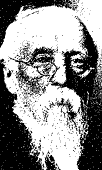 "Ask Nathan L. Krone. He'll
remember." This was the suggestion always made when
some newspaper writer wanted to settle some point regarding early
history of Decatur. For N. L. Krone was a sort of encyclopedia
of information about Decatur's early days, and its succeeding years.
He had come here in the year 1839, when he was seven yeas old, and
he lived here with the exception of a few years absence, until his
death in 1916. He was a quiet, observant man with a mind that
retained much, and he was always ale to tell the events of early
days which others had forgotten. Mr. Krone used to
like to recall the first meal he ever ate in Decatur. He never
forgot that meal, though it wasn't as much of a meal as many that he
ate afterwards, but it meant the family had arrived at the end of
their journey. That first meal was eaten at the camping ground
on the Town Branch, near the present site of the Prairie street
subway.2
The Krone family, the head of the family being David Krone, had come
to Decatur from Pennsylvania. In that day it was a big
undertaking to transplant a large family from Pennsylvania to
Illinois. The trip was by water from Harrisburg, Pa., to
Beardstown, Ill., then overland to Decatur. From Harrisburg to
Pittsburgh the family journeyed via canals, then came by steamboat
over the Allegheny, Ohio, Mississippi and Illinois rivers.
More than two months time was required for making the journey.
The camp ground on the Town Branch was an attractive and convenient
spot for newcomers to the city to use for camping until they could
get settled in homes. There was a fine spring of water, plenty
of fuel and a grassy little plateau where tents could be pitched.
At the time the Krones arrived there was no empty house in the tiny
village of Decatur, but they found a cabin near Casner where they
lived for a few months. In November they moved in to Decatur
to a house on William street, between Jackson and Franklin, which
Watson Culver had built for them. The next spring David Krone
became the proprietor of the Macon house, Decatur's first hotel, and
that was the home of the Krone family then for many years.
Later the Krones built a home on West William street.
Nathan Krone's first taste of business life was had when he started
to work for the S. K. Thompson dry goods store in 1848. From
there he went to the W. J. Condell store, and then, in 1852, he
began working for King & Read, druggists. From that time on he
was in the drug business. He worked for J. F. Roberts, W. C.
Armstrong, and E. A. West and then went into business for himself in
1893. He retired in 1915. Mr. Krone often saw
and talked with Abraham Lincoln, for Lincoln was a frequent visitor
at the Macon house when Mr. and Mrs. David Krone were proprietors.
He was at the Republican convention when Lincoln's name was
suggested for the presidency and the Lincoln rails were carried in.
--------------------- 1.
"Decatur's the place for an ambitious youth," said Mr.
Peddecord to young Burrows when he met the young man in
Philadelphia, where he had gone to buy goods for his store.
Burrows at that time was looking for a place to go into business and
settle down, the reason being that he was expecting to be
married. Peddecord persuaded Burrows that no place offered
more opportunity than Decatur, and to help matters along offered him
a job in his store.
"Can I keep the books?" Burrows asked. Peddecord
probably smiled to himself for his "bookkeeping" up to that time had
amounted only to making notes on slips of paper and sticking them
away in a drawer until the customers settled.
"Sure, you can keep books to your heart's content,"
answered Peddecord.
So Mr. Burrows became the bookkeeper and it wasn't long
until he made considerable improvement in Mr. Peddecord's methods of
keeping accounts. 2.
Being a curious little lad, the first thing Nathan Krone did on his
arrival in Decatur was to take an exploration jaunt, to see what
this new town had to offer in the way of sights.
The next morning after the family had reached Decatur Nathan
sauntered over to a stable across the way. There he found a
boy, and it doesn't take long for two boys to get acquainted.
Nathan found out the other boy was Dick and Dick learned the
little lad was called Nat. Dick was considerably older than
Nat, but that didn't matter.
Dick was starting on a trip out to the Allen place east
of Decatur and said Nat could go along. Nat went. Dick
was after a load of corn and Nat helped him get it out of the field.
They brought the corn in to the mill on East Prairie street.
It was a bit of diplomacy on Dick's part to take Nat along, thereby
having some help in getting that corn out, but Nat didn't care.
He was hungry for companionship and he had found it. Dick was
good company. That was the beginning of a long friendship
between Nathan L. Krone and Richard J. Oglesby, afterwards war
general, senator and governor of Illinois.
The two boys attended a school taught by Miss Fordyce
in a little house on Williams street between Franklin and Jackson.
The house had been built by Mr. Fordyce who owned a good deal of
land and who used the house for a shepherd's home. Captain
David L. Allen bought the land from Fordyce, and his brother, Lemuel
Allen, established a private school there, which lasted two years.
<PREVIOUS> <NEXT>
<CLICK
HERE TO RETURN TO TABLE OF CONTENTS>
|